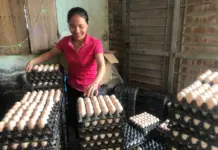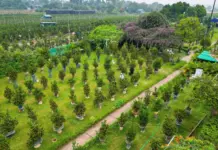Speaking at the opening ceremony, Director of Vietnam National Museum of History, Dr. Nguyen Van Cuong, said that the exhibition is a joint effort of his museum and other local museums in Binh Duong, Dong Thap, Hanoi, Lam Dong and Phu Tho, as well as heritage conservation centres and three German national museums.
Running until the end of July, the event features important findings in Vietnamese archaeology, particularly introducing the results of the archeological cooperation between Vietnam and Germany. Typical artifacts from prehistory to the 17th-18th centuries are introduced on an area of over 600 m2, divided into three main parts: prehistoric archeology; archaeological treasures of the metal age and historical archaeological treasures.
Delegates cut the ribbon to officially open the exhibition.
Prior to the event in Hanoi, the artifacts were on display at a range of museums in Germany, including Westfalen Archeology Museum in Herne, Chemnitz National Archaeological Museum in Chemnitz and the Reiss-Engelhorn Museum in Mannheim, from October 2016 to February this year, aimed at celebrating the 40th anniversary of the establishment of diplomatic relations (September 23, 1975-2015) and the 25th anniversary of the signing of the Cultural Agreement (May 10, 1990-2015), between Vietnam and Germany.
The collaboration of German and Vietnamese archaeologists in the excavations at Hum Cave (Yen Bai) in 1964 and O Chua Mound (Long An) during 2003-2007 marked the first milestones in the archaeological research cooperation between the two countries. The initial “handshake" laid the foundations for the following large-scale exhibitions of the Vietnamese archeological treasures in Germany, contributing to introducing Vietnamese history and cultural heritage to international friends.
According to Dr. Andreas Reinecke, a German archaeologist from the German Archaeological Institute, the series of Vietnamese exhibitions in his country’s well-known museums was a success, attracting over 100,000 visitors, including many Vietnamese people living in Germany.
German Archaeologist Andreas Reinecke talks to reporters on the success of a series of exhibitions featuring Vietnamese archaeological treasures in Germany over the past two years.
The archaeologist, who has over ten years of cooperation with his Vietnamese colleagues, also affirmed that on its return to Vietnam, the exhibition was special and different from the previous archaeological exhibitions in Vietnam, as the artifacts exhibited here have been collected during archaeological excavations over more than 60 years, typically grave artifacts discovered 55 years ago, which reflect the complex burial technique of the ancient Vietnamese, as well as more than 100 artifacts from the Bronze to Iron Age dating back 2,000 years ago.
Deputy Minister of Culture, Sports and Tourism Dang Thi Bich Lien said that the exhibition once again affirms the Vietnamese cultural values through each historical period, with several special unique artifacts only found in Vietnam. Lien added that after the success in Germany, her ministry would develop plans to organise more exhibitions featuring the Vietnamese archaeological treasures in the neighbouring countries in order to promote the Vietnamese cultural values to the world.
The exhibition runs until the end of July at the Vietnam National Museum of History, No. 1 Trang Tien street, Hanoi.
Director of Vietnam National Museum of History, Dr. Nguyen Van Cuong, receives artifacts donated to his museum from individuals and organisations.
The exhibition attracted great attention from the public at the opening.
A foreign visitor surveys the Vietnamese archaeological artifacts at the Hanoi exhibition.
Archaeological treasures collected across Vietnam are on display at the exhibition.
An antique from the Champa Kingdom from the 12th-13th century.
A bronze jar from the Dongsonian culture dating back 2,500-2,000 years ago.
A statue of Gajasimha from the Champa culture.













